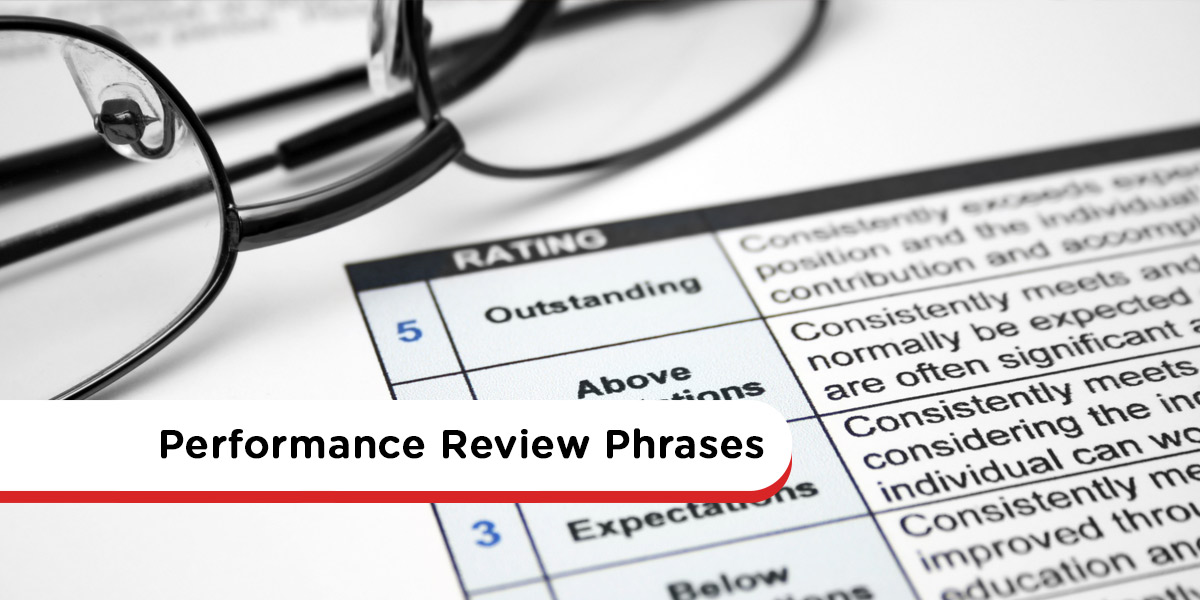
Your New Intranet Starts Here
Streamline communication, boost collaboration, and empower your team with MyHub's intuitive intranet solution.
Book a live demo now and experience the difference.
Take a Quick TourIt’s performance review season and you’re feeling the pressure. With multiple team members to assess and countless other priorities on your plate, finding the time to prepare, and to strike the right balance between positive and negative feedback, can be a real challenge. If this sounds familiar, you’re in the right place. Performance reviews are a vital part of employee engagement and play a key role in boosting productivity and overall employee performance. Preparation, however, is the foundation of success. In this article, we share 100 performance review example phrases you can easily adapt to suit your team. These phrases will help you provide professional, balanced, and constructive feedback that supports growth and engagement.
Performance Reviews – The Basics
Before we explore the detailed performance review examples, it’s important to understand the fundamentals of conducting effective reviews. A well-structured review not only provides valuable feedback but also strengthens trust and communication between managers and employees.
Be Positive And Honest
While maintaining a positive tone is crucial, honesty is just as important. If an employee is underperforming in a particular area, address it clearly but constructively. Provide actionable steps for improvement and offer support where needed. The key to success lies in maintaining a healthy balance of positive feedback and areas for growth, this helps employees stay motivated and open to development.
Encourage Two-Way Communication
A performance review shouldn’t be a one-way conversation. Use this time to listen to your employees’ perspectives on their workload, challenges, and successes. From an employee engagement standpoint, two-way communication helps staff feel valued and heard. You might even uncover innovative ideas or valuable insights from these discussions that can benefit your team or organization as a whole.
Set Specific And Achievable Goals
Clear, attainable goals are the cornerstone of effective employee motivation. Avoid vague or unrealistic objectives, as these can lead to frustration and disengagement. Instead, outline specific, measurable targets and clarify how you and the organization can support employees in reaching them. This shows your investment in their personal and professional growth, a key factor in long-term engagement and retention. You can even use your employee intranet to track progress and celebrate achievements collaboratively.
Go DPMAP!
DPMAP is the acronym for the Defense Performance Management and Appraisal Program, a performance evaluation system used for most civilian employees within the U.S. Department of Defense (DoD). In the following list, you’ll also find some federal performance appraisal examples like DPMAP progress review examples, which include specific, measurable achievements and areas for improvement, such as “Consistently exceeded sales targets by 10%” for a strength, or “Needs to communicate potential hazards promptly” for a weakness.
100 Performance Review Example Phrases
The following performance review examples are designed to inspire and guide your feedback process. They’re organized by key skills, attributes, and performance areas commonly covered in reviews. You’ll find both positive and constructive phrasing options to suit employees performing at different levels, from those exceeding expectations to those who need improvement.
Remember, though, that these review phrases are most effective when supported by real-world examples and measurable results. Always back your feedback with specific evidence to make it meaningful, actionable, and fair.
Achievements
- Improved overall productivity levels by x% or in the following key performance areas.
- Achieved or exceeded the goal [include specific goal] set in last year’s performance review by a margin of y%.
- Takes the initiative and is proactive in gathering information, assembling the tools or team members required to complete a project on time and to budget.
- Sets measurable goals for themselves and the team and regularly monitors performance.
- Provides strong evidence of achieving x,y or z specific task or accomplishment.
- Has not matched the performance of colleagues in relation to x,y,z productivity goal.
- Has fallen below the productivity target [include specific goal] set in last year’s performance review by x%.
Interpersonal Skills
- Works effectively within a team environment to achieve specific tasks or projects such as x,y,z.
- Develops constructive working relationships with internal and external stakeholders.
- Is an effective team player as demonstrated by their willingness to help out and contribute as required [specific examples would be helpful].
- Is proactive in sharing knowledge, skills and expertise with other team members.
- Could demonstrate more of a team focus by helping others achieve tasks to complete the overall project.
- Displays a tendency not to contribute in team or project meetings and doesn’t always participate in team activities or bonding exercises.
Attendance And Punctuality
- Is always punctual and is respectful of colleagues by arriving on time for meetings.
- Shows a willingness to go the extra mile during peak periods of work.
- Has an excellent attendance record of x% for the year.
- Has not met the required standards of punctuality and attendance.
- Sick leave and absence from work at x% are above the company average of y%.
Communication Skills
- Is an effective communicator as demonstrated by x,y and z.
- Displays the ability to communicate at all levels – up, down and across the business.
- Excels in developing lines of communication with external clients and stakeholders.
- Regularly contributes ideas and insights to team and project meetings.
- Needs to work on their written communication skills by doing x,y,z.
- Room for development of listening skills particularly in team meetings when different viewpoints are being expressed.
- Needs to display a greater willingness to participate in team and project meetings by contributing more ideas and insights.
Cooperation And Collaboration
- Is able to effectively collaborate with team and project members in order to complete a task.
- Shows a willingness to share ideas, best practice techniques and new ways of doing things.
- Is a team player and has a cooperative and harmonious disposition.
- Has a tendency to work in isolation.
- Can be overly negative or critical in making contributions to team or project meetings.
- Fails to see the bigger picture beyond the team and department.
Productivity
- Regularly exceeds the productivity targets set at each appraisal and review checkpoint.
- Consistently delivers beyond expectations in all areas.
- Exceeds the company’s productivity expectations for the job role or project function.
- Makes an outstanding contribution to the team’s productivity levels.
- Has not met the required productivity standards set for the job role or project function.
- Is inconsistent in meeting the productivity targets set at the performance appraisal and review checkpoints.
Time Management And Administration
- Regularly meets all required team and project deadlines.
- Always comes prepared for meetings with an agenda and supporting papers. Takes the time to digest the information and comes to meetings ready to make contributions.
- Effectively chairs meetings so that everyone is encouraged to make a contribution, agendas are kept on schedule and a clear record of outcomes and actions is circulated on time.
- Has improved the organization’s administration by implementing x,y or z.
- Has devised better ways to achieve x, y or z functions or administrative support systems and avoid duplicate information.
- Needs to improve time management abilities so that projects and tasks are consistently delivered on time and if not, then the reasons why are effectively communicated at the earliest opportunity.
- More attention could be paid to time management of meetings and meeting preparedness.
- Could contribute more by looking for innovations and improved ways of carrying out administrative support functions.
Leadership And Delegation Skills
- Understands the individual strengths of team members and is an effective motivator.
- Effectively delegates tasks to other team members with clear responsibilities and expectations.
- Displays a strong work ethic and sets an excellent example to others.
- Promotes a positive team environment that is reflective of the organization’s culture and values.
- Is willing to offer support and guidance to employees by [include examples].
- Finds it difficult to delegate to team members, preferring to maintain control.
- Needs to work on making team members feel comfortable in voicing concerns or bringing up issues.
- Does not encourage or reward the ideas and solutions offered by team members.
Problem-Solving Abilities
- Is creative and innovative in finding solutions to issues.
- Displays the ability to identify problems early on and is proactive in finding solutions.
- Always looks to address the underlying causes of problems rather than just the symptoms.
- Consistently encourages team members to find their own solutions to problems.
- Has a tendency to make excuses or blame others when things don’t go to plan.
- Becomes derailed and panicked in the face of problems and issues.
Creativity
- Excels in applying creative solutions to situations such as [cite example].
- Is willing to experiment with fresh approaches and ideas.
- Encourages team members to contribute new ideas and ways of working.
- Is hesitant about implementing innovations and new practices.
- Does not encourage or reward team members for their creative solutions.
- Rigidly sticks to traditional ways of working and shows an unwillingness to experiment.
Vision
- Has a clear sense of the company’s vision and how the team contributes.
- Is capable of translating visions into action plans.
- Excels in contributing to setting company goals.
- Lacks the ability to adequately communicate the company’s vision to team members.
- Needs to work on applying visions into clear actions and tasks.
- Tends to wait for new projects to be assigned rather than taking the initiative.
Customer Experience
- Displays the ability to work effectively with clients [include examples].
- Has a pleasant disposition and shows empathy when interacting with customers.
- Is able to handle difficult customers and situations.
- Constantly strives to improve the customer experience.
- Shows initiative when problem-solving customer problems [include examples].
- Needs to work on developing a better rapport and more responsive relationship with customers.
- Could be more proactive in dealing with customer concerns.
Learning Skills
- Is committed to continuing professional development both at a personal and team level.
- Shows a willingness to learn new skills, techniques and methods.
- Regularly shares learning experiences and knowledge with colleagues.
- Shows a reluctance to participate in formal training programs or professional development opportunities.
- Fails to promote a team learning culture.
- Struggles to identify learning opportunities for team members.
- Lacks initiative to proactively take on new tasks or projects.
Project Management
- Completed x project, on time and to budget with y results.
- Is able to set realistic project timelines and can make adjustments in response to changing circumstances.
- Sets clear project goals and objectives and makes the best use of available resources.
- Implements project reporting procedures that are timely and transparent.
- Falls below the required standards in project management because [cite examples].
- Needs to work on developing better cross-departmental working and reporting for organization-wide projects.
- Rigidly follows project management methodology even in the face of poor results or changing circumstances.
Potential
- Continually pushes for additional responsibilities.
- Is committed to learning new skills and implementing fresh ways of working.
- Always strives to improve skills and productivity across the team.
- Is capable of taking on additional responsibilities or a promotion.
- Is capable of handling bigger assignments.
- Could further develop their skills through additional training such as [give examples].
- Lacks the required initiative for a more senior role.
- Needs to acquire additional experience and knowledge in x, y, z to increase the possibility of career advancement.
Performance Review Phrases
Instead of staring at that dreaded blank page, these performance review example phrases should inspire you to get started with confidence. When done right, performance reviews can significantly improve productivity, boost staff morale, and enhance overall employee performance. More importantly, they help strengthen employee engagement across your organization, ensuring your business becomes more connected, motivated, and ultimately more successful.
Performance Reviews – Next Steps
Now that you’ve got the basics covered, take your preparation to the next level with our comprehensive guide featuring 100 performance review questions, designed from both a manager’s and employee’s perspective. Discover the right questions to ask to make your reviews more meaningful and results-driven. Explore the full guide here: performance review questions.
If you’re looking to further strengthen employee engagement in your organization, get in touch with the expert team at MyHub for a free intranet demo. With minimal investment, a cloud-based intranet can streamline communication, improve collaboration, and address key drivers of engagement, helping your teams stay informed, motivated, and aligned.
FAQ Section
Why use ready-made performance review phrases instead of writing from scratch?
Because having a structured vocabulary helps reviewers express feedback clearly and consistently, avoid bias or vagueness, and focus on behaviours and outcomes rather than generalities.
Can these phrases be used verbatim?
They can be a useful template, but they should always be customised: include specific examples, data (if available), and align them with the individual’s role and context to keep them meaningful.
What should managers focus on beyond the phrasing?
Beyond wording, managers must ensure the review process includes listening to the employee’s perspective, setting actionable goals, committing to follow-up, and supporting development—not just delivering commentary.




